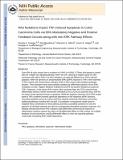RAS Mutations Affect Tumor Necrosis Factor–Induced Apoptosis in Colon Carcinoma Cells via ERK-Modulatory Negative and Positive Feedback Circuits Along with Non-ERK Pathway Effects
Author(s)
Kreeger, Pamela K.; Mandhana, Roli; Haigis, Kevin M.; Hughes-Alford, Shannon Kay; Lauffenburger, Douglas A
DownloadLauffenburger-2009-Ras Mutations Affect Tumor Necrosis Factor.pdf (1.665Mb)
OPEN_ACCESS_POLICY
Open Access Policy
Creative Commons Attribution-Noncommercial-Share Alike
Terms of use
Metadata
Show full item recordAbstract
More than 40% of colon cancers have a mutation in K-RAS or N-RAS, GTPases that operate as central hubs for multiple key signaling pathways within the cell. Utilizing an isogenic panel of colon carcinoma cells with K-RAS or N-RAS variations, we observed differences in tumor necrosis factor-α (TNFα)–induced apoptosis. When the dynamics of phosphorylated ERK response to TNFα were examined, K-RAS mutant cells showed lower activation whereas N-RAS mutant cells exhibited prolonged duration. These divergent trends were partially explained by differential induction of two ERK-modulatory circuits: negative feedback mediated by dual-specificity phosphatase 5 and positive feedback by autocrine transforming growth factor-α. Moreover, in the various RAS mutant colon carcinoma lines, the transforming growth factor-α autocrine loop differentially elicited a further downstream chemokine (CXCL1/CXCL8) autocrine loop, with the two loops having opposite effects on apoptosis. Although the apoptotic responses of the RAS mutant panel to TNFα treatment showed significant dependence on the respective phosphorylated ERK dynamics, successful prediction across the various cell lines required contextual information concerning additional pathways including IKK and p38. A quantitative computational model based on weighted linear combinations of these pathway activities successfully predicted not only the spectrum of cell death responses but also the corresponding chemokine production responses. Our findings indicate that diverse RAS mutations yield differential cell behavioral responses to inflammatory cytokine exposure by means of (a) differential effects on ERK activity via multiple feedback circuit mechanisms, and (b) differential effects on other key signaling pathways contextually modulating ERK-related dependence.
Date issued
2009-10Department
Massachusetts Institute of Technology. Department of Biological Engineering; Koch Institute for Integrative Cancer Research at MITJournal
Cancer Research
Publisher
American Association for Cancer Research
Citation
Kreeger, P. K. et al. “RAS Mutations Affect Tumor Necrosis Factor-Induced Apoptosis in Colon Carcinoma Cells via ERK-Modulatory Negative and Positive Feedback Circuits Along with Non-ERK Pathway Effects.” Cancer Research 69 (2009): 8191-8199.
Version: Author's final manuscript
ISSN
0008-5472
1538-7445